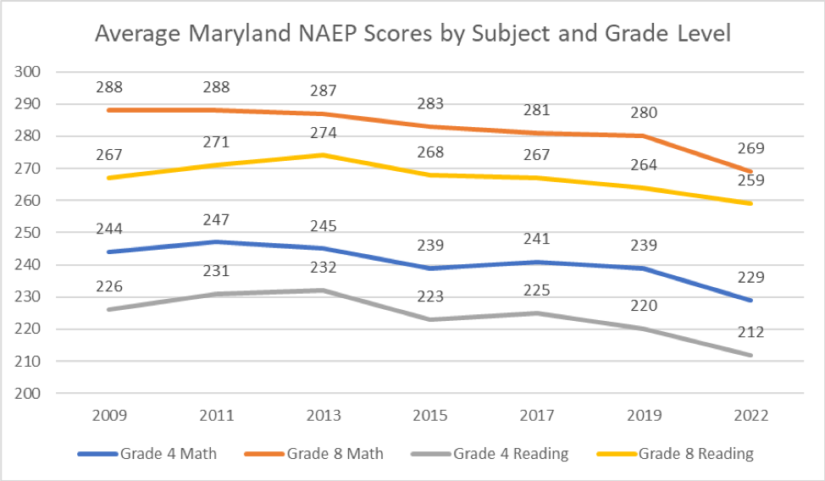Former Mississippi Schools Chief Aims to Repeat Learning ‘Miracle’ in Maryland
But her success could be tested in a state that has been rocked by post-COVID learning loss and beset by bureaucratic woes.

Get stories like this delivered straight to your inbox. Sign up for The 74 Newsletter
Updated January 3
When Maryland hired a new state superintendent of schools in October, the reaction among education observers was one of excitement — mixed with a sense of relief.
Carey Wright, who has been appointed on an interim basis to complete the term of outgoing Superintendent Mohammed Choudhury, is a top-tier recruit with deep ties to Maryland. She spent decades working as a teacher and administrator in some of the state’s largest school districts before serving a nine-year stint as schools chief in Mississippi, where she was credited with leading a highly successful overhaul to literacy instruction.
Locals are hoping her appointment can jump-start a similar revival in Maryland, where pandemic-era learning loss has dealt a severe blow to student scores that once ranked among the best in the country. She will also be charged with steadying the Maryland State Department of Education after Choudhury’s rocky two-year tenure at its helm, which ended in September amid allegations that his leadership style created a “toxic” environment and caused friction with state authorities.
The uncertainty around Choudhury’s departure (he will continue to collect a salary and act as an advisor to the state board going forward) led to a dilemma that was only fitfully resolved, said Kalman Hettleman, a longtime education policy observer who has been highly critical of the former superintendent. While lambasting the lack of progress on lost learning in recent years, he called the board’s choice of Wright as his replacement a “grand slam” selection.
”It looked like we were stuck,” Hettleman said. “We’re un-stuck now.”

Still approved to serve only through the rest of Choudhury’s term, which ends next June — the state has hired an education consultancy to lead a nationwide search for the next superintendent — Wright has already announced that she intends to seek the job on a permanent basis. In her introductory press conference, she also seemed to hint that she would pursue a dedicated literacy strategy similar to the one she followed in Mississippi, noting that children must “learn to read in order to love to read.”
Wright’s time in the South coincided with one of the most impressive turnarounds in the history of American education. Between 2013 and 2022, Mississippi fourth graders made gigantic strides on both the reading and math sections of the National Assessment of Educational Progress, a federal exam commonly referred to as the Nation’s Report Card. While not improving as quickly, eighth graders also saw consistent growth in both subjects, and the success was spread widely among students of differing racial and socioeconomic backgrounds.
In all, elementary schoolers in Mississippi began the last decade mired among the lowest-performing students in the country and finished at or above the national average. In fact, a data tool devised by the nonprofit Urban Institute shows that Mississippi would be one of the top-performing states in the country if NAEP scores were adjusted for demographic factors such as race, poverty level, and special needs status.

By contrast, Maryland has experienced a steady decline in achievement over the same 10-year span, and its fourth graders now read and compute at a lower level than Mississippi’s. This in spite of the fact that Mississippi is one of the poorest states in the U.S. and Maryland one of the richest; according to an estimate by the National Education Association, Maryland spends approximately 56 percent more on each of its pupils than does Mississippi. The release of state standardized test scores this summer showed that while slightly more students passed Mississippi’s exams than in 2019, Maryland pupils are still lagging behind their pre-pandemic performance.
Annette Campbell Anderson, an assistant professor at the Johns Hopkins School of Education and deputy director of the university’s Center for Safe and Healthy Schools, said the “abysmal” scores caused consternation among the state’s education community.
“Everyone has recoiled a bit because Maryland is so used to being in the upper echelons of achievement for both literacy and math,” Anderson said. “Now it feels like we’re stuck in the middle.”
Battling ‘complacency’ on reading
Wright’s task will be to replicate a version of what she executed in her last stop.
Mississippi’s rapid improvement came only after policymakers there — including, but not limited to, its superintendent — fundamentally shifted the state’s approach to instruction and accountability, with a particular focus on reading. Teachers and administrators were provided with special, evidence-based training; literacy coaches were dispatched to schools that struggled with the subject; and in many instances, kids who couldn’t pass a reading test at the end of the third grade had to repeat the year in school.
The approach reflects a focus on what educators call the “science of reading,” the wide body of psychological and neuroscientific research into how people come to understand the written word. In the last decade, dozens of states have passed laws informed by that research and designed to put children on a path to reading proficiency by the end of the third grade. Maryland has yet to take similar steps. The state’s “Ready to Read” legislation, passed in 2019, mandates that incoming kindergartners be screened for reading challenges, and school districts have been offered funds in exchange for switching to higher-quality curricula, but stricter requirements around student assessment and retention haven’t been imposed.
Instead, the state has concentrated on rolling out a separate policy, called the Blueprint for Maryland’s Future. Estimated to cost nearly $4 billion before it is fully implemented in the 2030s, the plan seeks to provide more resources to schools serving poor students, extend public pre-K offerings and raise teacher salaries, among other priorities. Its ambition and cost have made it one of America’s most-watched education reforms, but Hettleman said that the Blueprint’s authors didn’t sufficiently emphasize the kind of changes necessary to improve reading results.
“The legislative leadership in Maryland thought that the Blueprint was the be-all, end-all, cure-all for everything, and it wasn’t,” Hettleman said. “That bred a kind of complacency as other states developed specific reading initiatives.”
Wright, who declined an interview request, will now have responsibility for making the plan work. In part, her duties will include mending relationships with Maryland education authorities, including the state board of education, which were frayed under Choudhury’s leadership. A number of high-ranking employees at the state Department of Education quit during 2022, with some complaining of the then-superintendent’s allegedly brusque manner. He also attracted criticism for his habit of addressing subordinates through encrypted messages on his personal phone.
The effects of the previous years’ staff departures are still to be seen. Employee directories at the departmental website were last updated in 2022, and former senior officials have warned of “brain drain” as years of organizational experience are lost, whether due to clashes with Choudhury or more conventional turnover. This spring, the department announced it would return over $800,000 in federal funding for salaries and professional development in the area of career and technical education, a move that some former staffers attributed to inaction by leadership. (According to state documents, the Department of Education later allowed for the money to be recouped and disbursed after the original grant term had expired.)
In the final months of Choudhury’s tenure, the department announced that it had reduced its job vacancy rate by over 50 percent. But even that progress wouldn’t solve the atrophy of staff experience and relationships, Anderson said.
“People I had historically worked with at the Maryland State Department of Education — who I’d had as colleagues for years — very few of them have remained at the department,” she noted. “Whether or not the positions are filled, we have to go back to the brass tacks of getting to know who people are, and all our institutional knowledge has been swept away.”
In an October exit interview with The 74’s Beth Hawkins, Choudhury lamented that he had not “spent more time engaging, talking to people who are power brokers, who have more political capital, who have the ability to ultimately be for or against something and can either work against you or for you.”

Supporters of Wright say that her extensive background as a former state schools chief shows that she is able to productively collaborate with the wide array of constituencies that will determine the success of her agenda: the state board, teachers’ unions and local districts, which have traditionally operated with considerable autonomy in Maryland.
In particular, she may need to repair her department’s relationship with the Accountability and Implementation Board, the body specifically charged with overseeing the Blueprint over the next decade. Earlier this year, the board and the superintendent’s office publicly clashed over which entity had the authority to approve districts’ plans to enact Blueprint-related policies.
Brit Kirwan is the former chancellor of the University System of Maryland and served as the chair of the state’s Commission on Innovation and Excellence in Education, the recommendations of which helped produce the Blueprint. Noting the difficulty of leading an academic recovery in Maryland while simultaneously working to realize generational changes in education policy, he called Wright’s appointment “a gift from the gods.”
“We’re undertaking a degree of reform that is unprecedented in the United States,” Kirwan said. “It requires enormous talent for an administrator in organization and collaboration and building broad bases of support to pull this off.”
Get stories like these delivered straight to your inbox. Sign up for The 74 Newsletter

;)
